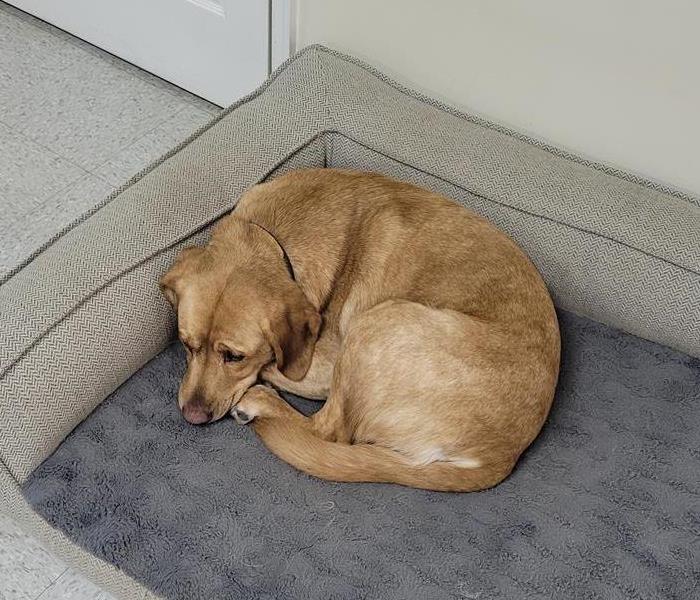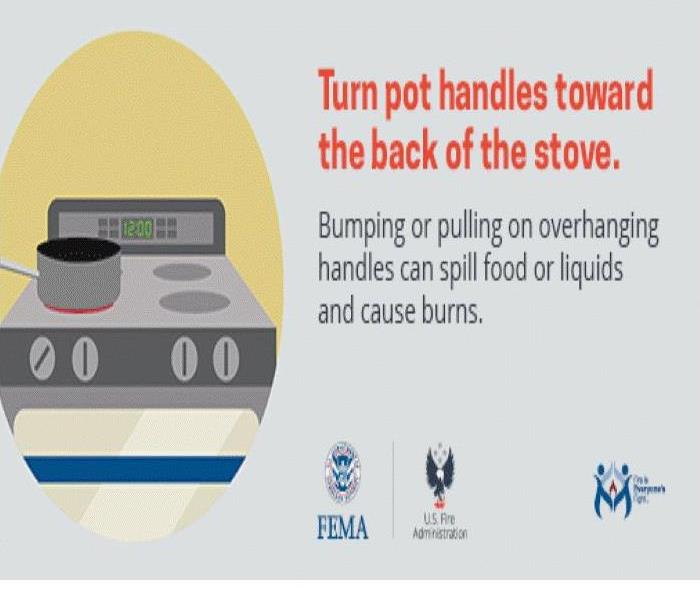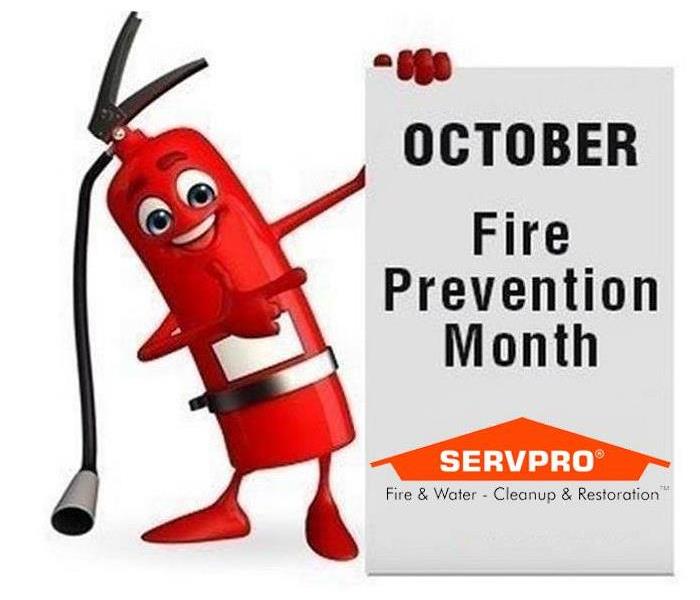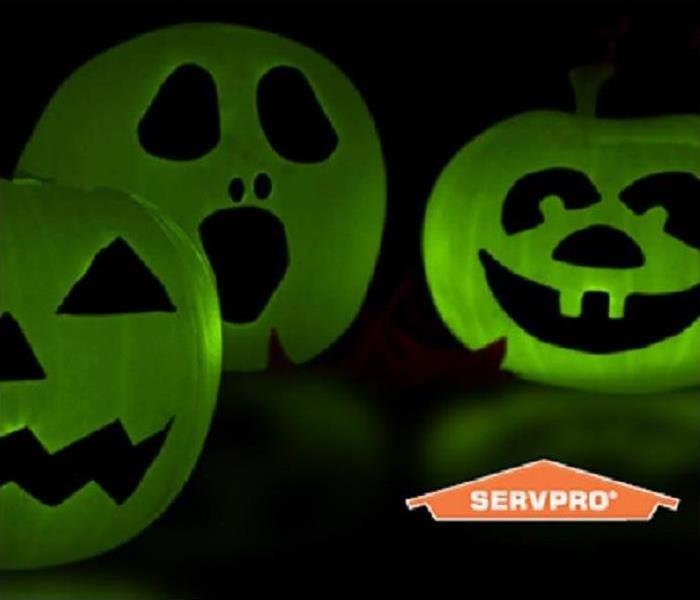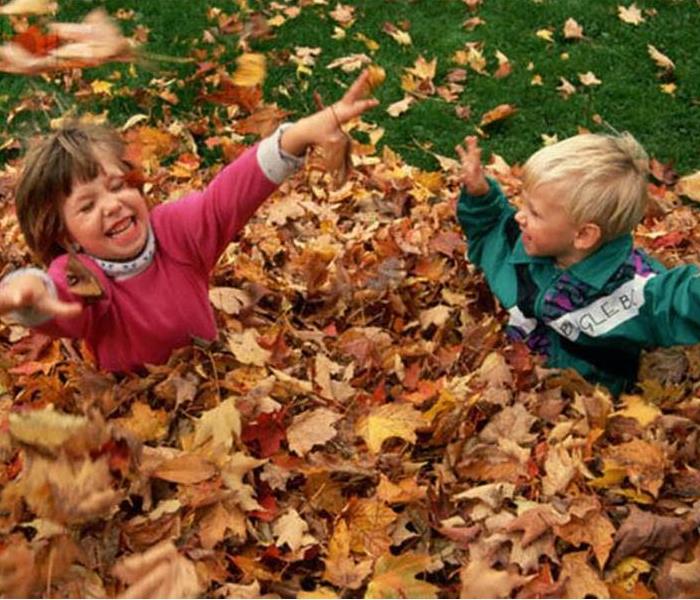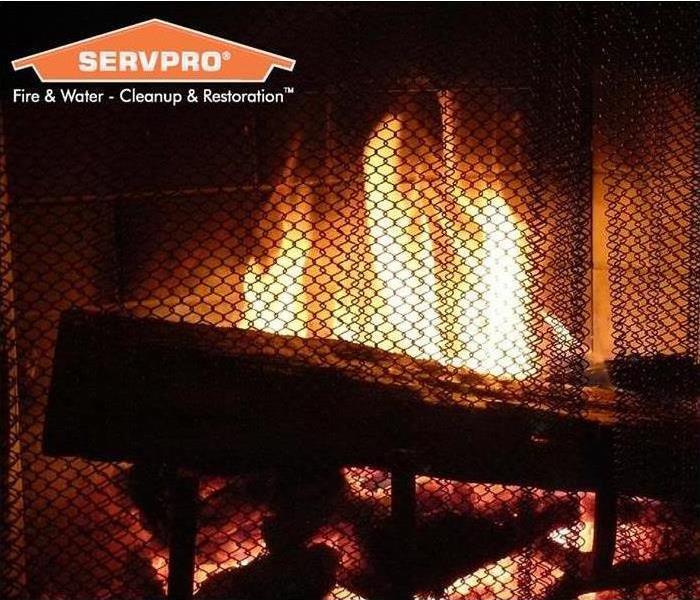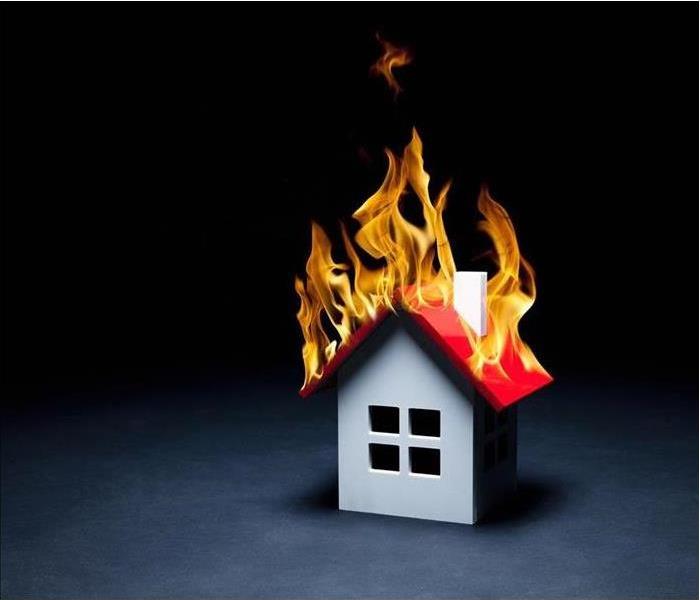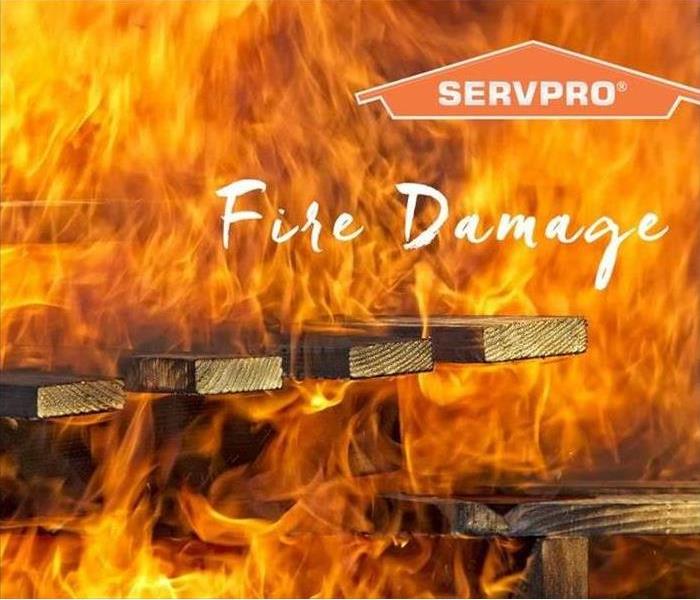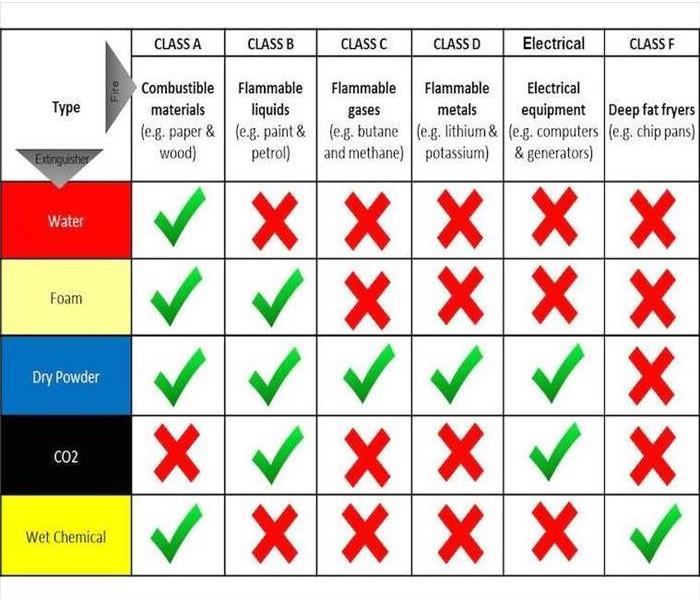Recent Fire Damage Posts
Sustainable, Reliable Fire Restoration Services in Harrisonburg
9/3/2024 (Permalink)
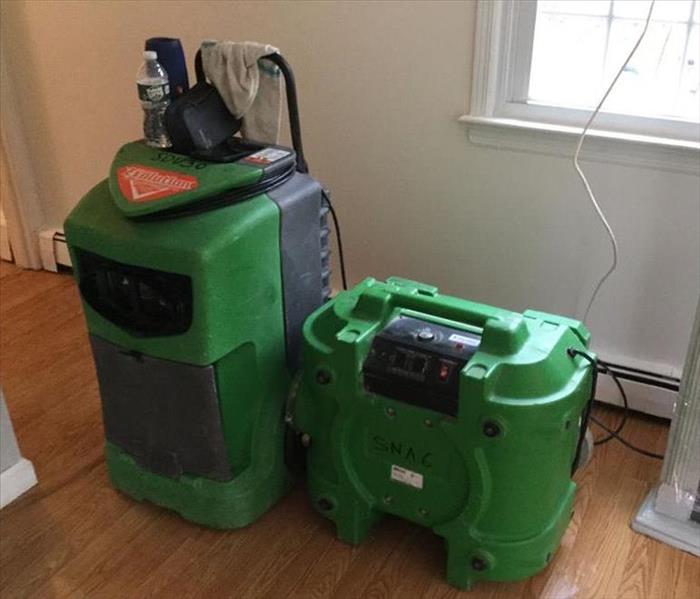 SERVPRO strives for sustainability when restoring fire damaged Harrisonburg homes. Even our equipment is green!
SERVPRO strives for sustainability when restoring fire damaged Harrisonburg homes. Even our equipment is green!
Embracing Eco-Friendly Methods and Materials for a Greener Future
Restoring your home after a fire in Harrisonburg is a priority. Today, more homeowners are seeking fire restoration practices that not only repair the damage but also contribute to a more sustainable future. Our team at SERVPRO® is at the forefront of this shift, incorporating eco-friendly practices into every step of the restoration process.
Sustainable Materials and Methods
One key trend in fire restoration in Harrisonburg is the use of sustainable materials. From recycled building materials to non-toxic paints, we prioritize products that reduce environmental impact. This approach not only restores your home but is also kinder to the planet.
The Green Restoration Process
Our commitment to sustainability always extends to the methods we use in restoration:
- Eco-Friendly Cleaning: We use biodegradable cleaning agents that are tough on soot and smoke but gentle on the environment.
- Energy-Efficient Equipment: Our tools and machinery are designed to minimize energy consumption, reducing the restoration process's carbon footprint.
- Water Damage Mitigation: To prevent any further water damage, we employ advanced drying techniques that use less energy while effectively removing moisture.
Why Sustainability Matters
Choosing sustainable fire restoration in Harrisonburg means making a positive impact on our environment while restoring your home. Here’s why it’s important:
- Reduced Waste: Sustainable practices minimize the amount of waste sent to landfills.
- Healtheir Home: Eco-friendly materials and methods create a healthier living environment free from harmful chemicals.
- Future-Proofing: Sustainable restoration practices contribute to long-term resilience against future damage.
Contact Us for Eco-Friendly Restoration
If you’re looking for fire restoration services in Harrisonburg that align with your commitment to sustainability, we’re Here to Help® 24/7. Our team combines expertise in fire and water damage restoration with a focus on environmentally responsible practices. Call SERVPRO of Rockingham and Augusta Counties at (540) 433-6100 to start your sustainable restoration journey. Together, we can rebuild your home while caring for our planet.
Expert Fire Restoration Services in Staunton
11/1/2023 (Permalink)
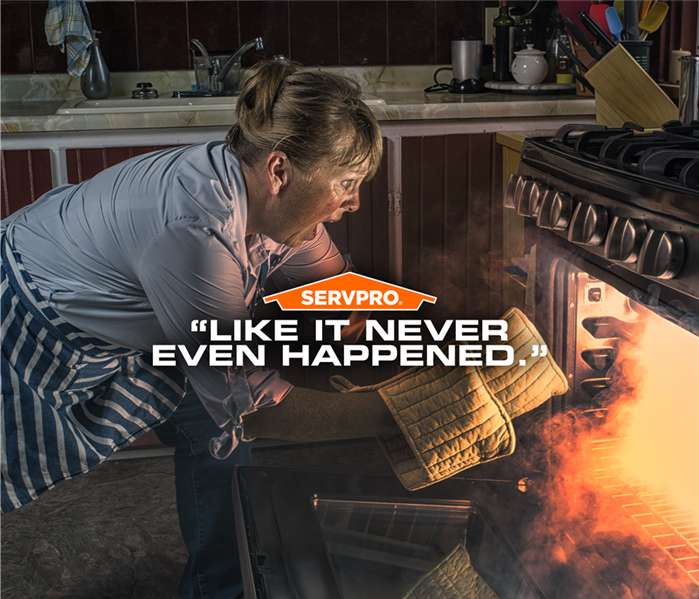 When the oven tries to cook your entire Staunton kitchen, call SERVPRO for fire damage cleanup. "Like it never even happened."
When the oven tries to cook your entire Staunton kitchen, call SERVPRO for fire damage cleanup. "Like it never even happened."
SERVPRO®: Staunton's Fire Cleanup Specialists
In Staunton, the kitchen is not just a space for preparing meals; it's a hub for family gatherings and cherished moments. However, unexpected events, like a sudden fire from a distracted cooking moment on a stove or a malfunctioning appliance, can disrupt the tranquility of this essential home space.
Dealing with the aftermath of a kitchen fire can be challenging, especially when reminders of the incident linger. Staunton residents coping with fire damage can rely on SERVPRO professionals. With their advanced equipment and trained personnel, they ensure that kitchens affected by the fire are restored to their former state, including eliminating the smoke odors.
The effects of a kitchen fire can be distressing, and this is where SERVPRO steps in with its systematic approach:
- Counters and appliances blackened in soot.
- A pervasive smoke odor that clings to fabrics and surfaces.
- Walls and ceilings marred by stains and discolorations.
- Cabinets and drawers that require attention and care.
Fire Damage Cleanup Common Actions
A comprehensive evaluation determines the extent of the damage.
Using specialized tools, the technicians meticulously clean soot and residue. Innovative deodorization methods tackle and eliminate odors. Any damaged structures and contents are carefully restored whenever possible, ensuring a fresh and clean appearance. SERVPRO aims to save damaged contents through repair and restoration using their proprietary methods. Quality control measures are a final step to ensure that air quality and surfaces are left clean and ready to prep food again safely.
For residents of Staunton facing the challenges of fire-related damages, SERVPRO offers reliable and professional solutions for homes and contents. With their commitment to excellence and ongoing training for the latest techniques in restoration, homeowners can soon return to enjoying their kitchens to the fullest.
SERVPRO of Rockingham and Augusta Counties is Here to Help® at (540) 433-6100 24/7 for any size fire restoration services.
Working Through Harrisonburg Fire Damage In Several Phases
4/10/2023 (Permalink)
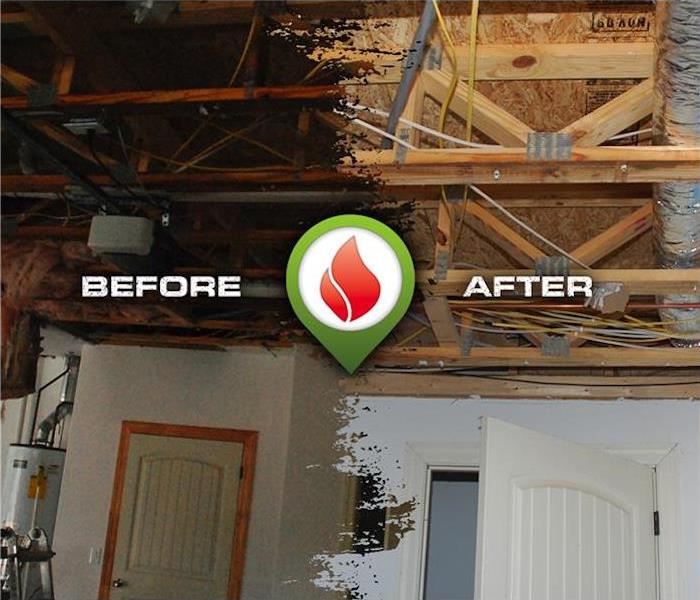 Have a fire damaged home in Harrisonburg? Call SERVPRO to make it appear "Like it never even happened."
Have a fire damaged home in Harrisonburg? Call SERVPRO to make it appear "Like it never even happened."
Needed Restoration After Fire Damages
Across the nation, it is estimated that more than 350,000 house fires occur every year. Varying degrees of damage might not always warrant the full designation of a structure fire, but the frequency of these emergencies requires our SERVPRO team to stay prepared.
To recover after Harrison residential fire and smoke damage in a residence, our responding technicians must offer:
- Emergency Services – The first step our team can take in disaster relief is protecting the structure and its contents through pre-inspection board-up, air filtration, and debris removal.
- Mitigative Strategies – Mitigation follows emergency services and coincides with a detailed record of the damage to the property and the necessary steps to restore the residence. From water removal to content management, mitigation is a critical process.
- Cleaning Needs – Surface cleaning and soot removal are one of the universal needs after a fire. We have powerful cleaners and solvents to help achieve this.
- Repairing the Structure – Structure fires are known for their destructive impact on the building. Combustion creates situations where extensive build-back services are necessary to return a property to preloss condition.
Harrisonburg fire damage events require a team of restoration professionals capable of making fast changes and navigating hundreds of restoration questions and obstacles. From the first notice of loss, our SERVPRO professionals are beginning to provide necessary restoration and mitigation solutions.
Can Emergency Services Help Fire Damaged Homes?
Emergency services are a combination of the earliest efforts to prevent situations like structural collapse or hazardous conditions for occupants or responding technicians. The urgency of these actions often has them preceding pre-job scoping.
How Does Fire Damage Mitigation Occur?
Mitigation is one of the more critical restoration phases, as it seeks to resolve pressing concerns that threaten the structure and its occupants. This can include the careful management of damaged contents and personal belongings. Mitigative actions can also describe needed efforts for removing water after extinguishment.
Focused Cleaning After Fire Damage
Cleaning is a way to return a property to its original condition. There are dozens of proven approaches, much of which are created to overcome formidable effects like soot and smoke damage.
- Removing Smoke Soils and Soot – Residues can be a difficult obstacle to overcome, especially in wet environments. We have multiple products to help emulsify or dissolve soil deposits.
- Deep Carpet Cleaning – Hot water extraction cleaning breaks sediment loose at the base of carpeted flooring and removes it with the high-powered onboard vacuum.
- Deodorization – We must also work to eliminate overwhelming and offensive odors that have developed in the living space. These smells do not naturally dissipate, so direct action with deodorants and neutralizing tools is necessary.
Post-Fire Build-Back Services
Structures fires can be disruptive and destructive. Damage to construction materials and the house assemblies is expected, so we arrive with experienced professionals that can help. We have a general contractor license to perform needed build-back services after home fire damage. From the initially controlled demolition to the reinstallation of missing structural elements to return a property to its original condition, we can seamlessly transition to repairs and reconstruction after restoration.
Harrisonburg fire damage can result from many different sources, making it vital to have experienced professionals ready to respond at all times. We are preferred insurance vendors to complete damage claim work for homes and businesses. Give our SERVPRO of Rockingham and Augusta Counties team a call when you need us at (540) 433-6100.
Why You Need Expert Fire Damage Repair in Harrisonburg
2/3/2023 (Permalink)
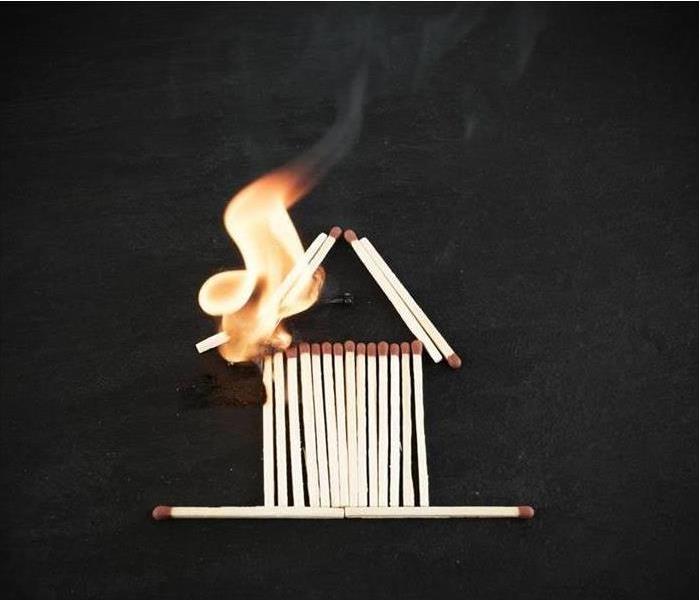 If you find yourself in need of assistance with fire damage remediation, call SERVPRO.
If you find yourself in need of assistance with fire damage remediation, call SERVPRO.
Fire Damage in Harrisonburg Homes Calls for SERVPRO’s Help
A fire can ruin various parts of your home differently, and each might require specific cleaning, restoration, and rebuilding strategies. In some situations, you may not see the extent of the damage, like when it occurred in areas such as behind walls or the attic.
Competent restorers can identify the degree of damage and offer you an overview of the contents and areas of your house that can be restored. You can trust SERVPRO to handle the fire damage in your Harrisonburg residence competently. Your situation is unique, but our restoration experts can take these standard steps to restore your property.
- Perform an inspection
- Prevent additional damage
- Clean-up
- Repair and reconstruction
Perform an Inspection
Our SERVPRO technicians can evaluate the damage extent to your house and its contents to determine what we can salvage. As we conduct the inspection, we can also test rooms for soot damage using specialized tools. After the initial assessment, we can explain our cleaning process and offer an overview of how long the restoration process might take.
Prevent Additional Damage
It is our priority to prevent further destruction to your house. Our restorers can quickly remove your home’s contents because leaving them long in affected areas makes it more challenging to clean them. The fire may have caused leaks in your home. In that case, we can remove the water using pumps and dry the affected surfaces with air movers and dehumidifiers.
Clean-up
The destruction a fire, smoke, and water cause can quickly increase. Therefore, our SERVPRO team can use various cleaning equipment and agents to salvage flooring, furniture, and other items affected by smoke, water, and soot. We can eliminate smoke residues from your home’s interior and exterior surfaces. The residues usually give off smoke smells. Therefore our technicians can also use deodorizing products like odor counteractants to neutralize odors.
Repair and Reconstruction
SERVPRO can work to get you back into your home by repairing or reinstalling floor coverings and floors, installing tack strips, and replacing or repairing subfloors.
Don’t hesitate to seek help from SERVPRO of Rockingham and Augusta Counties after fire damage. Our 24-hour helpline is (540) 433-6100.
Cleaning Staunton Home Smoke Damages During Fire Restoration
8/3/2022 (Permalink)
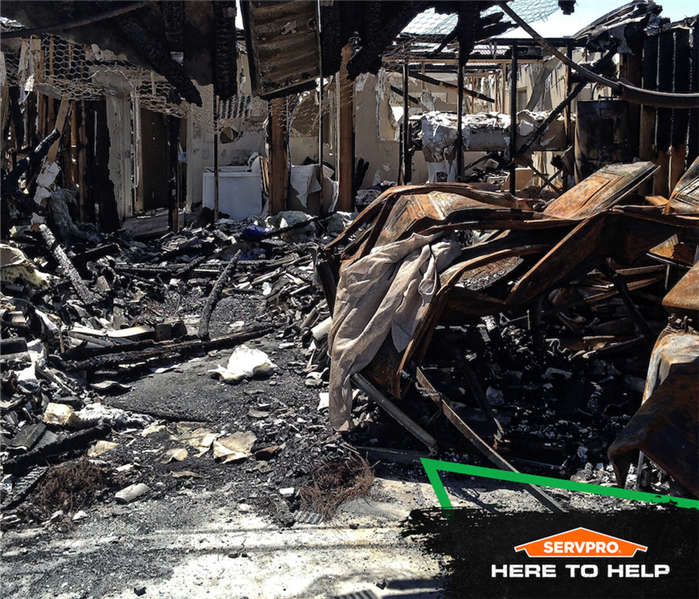 Fire damage restoration for your home is no DIY task. SERVPRO will be on-site within 4 hours of the initial call.
Fire damage restoration for your home is no DIY task. SERVPRO will be on-site within 4 hours of the initial call.
Smoke Damage Requires Prompt Fire Restoration
Resolving smoke issues is one of the priorities of post-fire recovery. To determine the best approach for cleaning and restoration, SERVPRO professionals must investigate the source of the disaster and evaluate the type of smoke damage left behind. Typically, Rockingham and Augusta County homes experience three types of smoke damage:
- Dry Smoke Residues
- Wet Smoke/Moist Soils
- Protein Residues
Dry Residues
Residual deposits are a common byproduct of combustion. High heat fires produce the thinnest and most far-spread effects. Despite being light residues, permanent fire damage in Staunton can still result without the right tools. We have chemical sponges to trap soils on the surface and protect the impacted building materials. Dry vacuuming before the sponge cleaning can also improve this process's effectiveness.
Wet Smoke Deposits
When the environment is moist, or water has become a factor in slowing the progression and heat of a fire, wet smoke damage results. Unlike dry smoke, sticky deposits are likely to smear and stain. Implementing necessary cleaning agents like detergents and chemicals to trap and lift soils to protect these impacted substrates from permanent damage is vital.
Grease Fires in the Kitchen
Protein residues are a challenging obstacle for restoration as well. Grease fire residues adhere to all available surfaces around the range where the fire originated, so wall surfaces, backsplash materials, cabinets, countertops, and flooring can all be impacted. Solvents dissolve grease deposits, working to restore and preserve the underlying material where replacement could be costly - like custom cabinets.
While all fires can be damaging and destructive to area homes, the methods of cleaning up after extinguishment change by the smoke type. Understanding the damage impacting your property helps get the right restoration approaches started as soon as possible. Give our SERVPRO of Rockingham and Augusta Counties fire restorers a call today at (540) 433-6100.
SERVPRO Saves Staunton Homes from Lasting Effects of Fire Damage
7/6/2022 (Permalink)
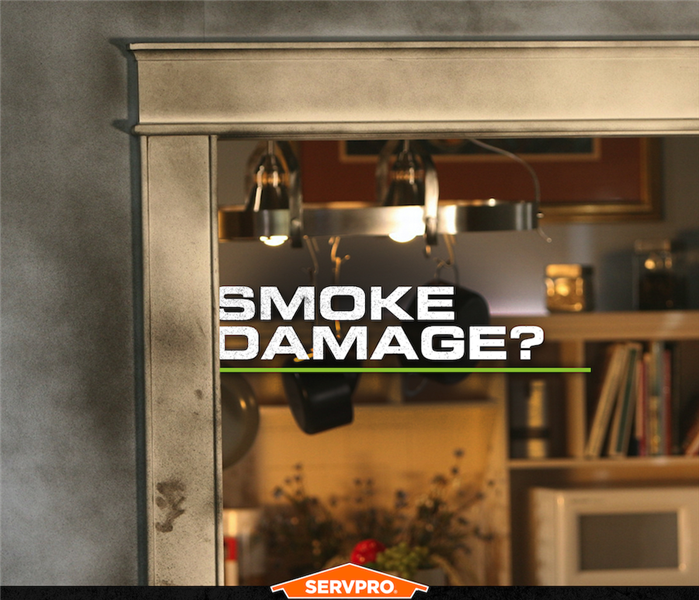 Soot from fire damage is no easy task to handle. SERVPRO technicians know all the tricks of the trade along with having experience.
Soot from fire damage is no easy task to handle. SERVPRO technicians know all the tricks of the trade along with having experience.
Cleaning Staunton Homes After Fire Damage
The layer of smoke and soot left after fire damage to your Staunton home can cause lasting damage if not cleaned promptly. SERVPRO techs use several cleaning agents and techniques to remove the residue as quickly as possible to limit the potential damage.
SERVPRO techs use cleaning strategies that break the bonds between the soils and the surface they adhere to during the cleanup of fire damage to your Staunton home. The cleaning methods used depend on several factors, including the soil's nature and the surface involved.
Breaking Bonds Between Soils and Surfaces During Fire Restoration
The four key cleaning actions that SERVPRO techs use to loosen soils from the various surface include-
- Mechanical agitation is the initial step to dislodge soil, cleaning smoke and soot residue. Techs use sponges and scrubbers to remove loosely bound residue before using other cleaning methods.
- Lubrication helps the soil particles "slide" into the cleaning solution. SERVPRO techs use detergent solutions to lubricate the soils and emulsify oily residues into the cleaning solution.
- Chemical action can alter the chemistry of the soils breaking their bonds with surfaces. Enzymes, oxidizing and reducing bleaches remove the residue after fire damage by chemical action.
- Suspension and dispersion refer to extracting the surface residue into the cleaning product. Suspension of residue occurs when soil dissolves or emulsifies in a cleaning product.
Combining these cleaning actions ensures that the residue left behind after fire damage is removed before it can create any permanent damage. SERVPRO works hard to ensure that your home is restored "Like it never even happened."
Call SERVPRO of Rockingham and Augusta Counties at (540) 433-6100 to know how we can help.
How Professional Fire Restoration Helps Harrisonburg Homes
6/26/2022 (Permalink)
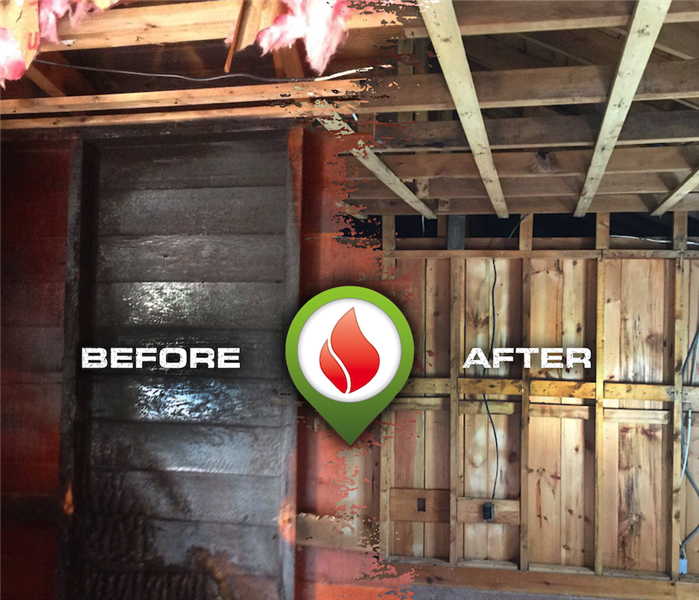 Fire damage restoration for your Harrisburg home is no DIY project. call the professionals at SERVPRO for all the help you need.
Fire damage restoration for your Harrisburg home is no DIY project. call the professionals at SERVPRO for all the help you need.
SERVPRO Fire Repair Reassures Harrisonburg Homeowners
In the aftermath of a fire, you may be presented with numerous options to resolve the wide range of arising challenges. You may opt to tear down everything and make replacements. You might also decide to hire separate professionals to handle each problem that develops in your Harrisonburg home. Each fire restoration approach that you choose may present some advantages.
Choosing a professional fire restoration company in Harrisonburg to handle everything simultaneously may be the best option. For the homeowner's benefit, a company like SERVPRO operates several procedures, including controlled demolition, cleaning, and refinishing, running them concurrently whenever possible.
Benefits of professional restoration
- Reducing recovery costs
- Limiting the downtime
- Saving sentimental items
The most costly way to resolve fire damage is to replace contents and structural materials. Approaches that involve stripping off materials are also expensive. Cleaning is usually the cheapest recovery option. SERVPRO crews use several advanced technologies to maximize cleaning effectiveness, limiting the things you must replace. Methods like Peroxide-Active cleaning, blast cleaning, and ultrasonic cleaning significantly improve the outcome and limit damages when cleaning acoustic ceiling panels, unfinished wood, and kitchenware.
Things Complicating Restoration
Most things done during fire restoration are not extraordinary, so anyone with some technical skills can accomplish them. However, managing all the issues can introduce unexpected complications that limit effectiveness or cause unnecessary delays. Convenience is one of the advantages you enjoy when a SERVPRO crew handles fire damage for you.
The main aspects to manage
- Time
- Debris
- Cleaning processes
Leaving fire residues or moisture to accumulate on surfaces over an extended period leads to secondary deterioration. Controlling something like moisture is challenging without the right equipment. Our SERVPRO crews readily overcome this by setting up dehumidifiers immediately on arrival at the property to reduce humidity, thus facilitating the drying of materials. When demolishing structural areas such as ceilings, we use giant trash cans to hold debris.
SERVPRO of Rockingham and Augusta Counties carefully manages fire restoration to guarantee a positive outcome. Call us at (540) 433-6100. We're Faster To Any Size Disaster.
The Importance of Expert Fire Damage Cleanup in Harrisonburg Homes
5/18/2022 (Permalink)
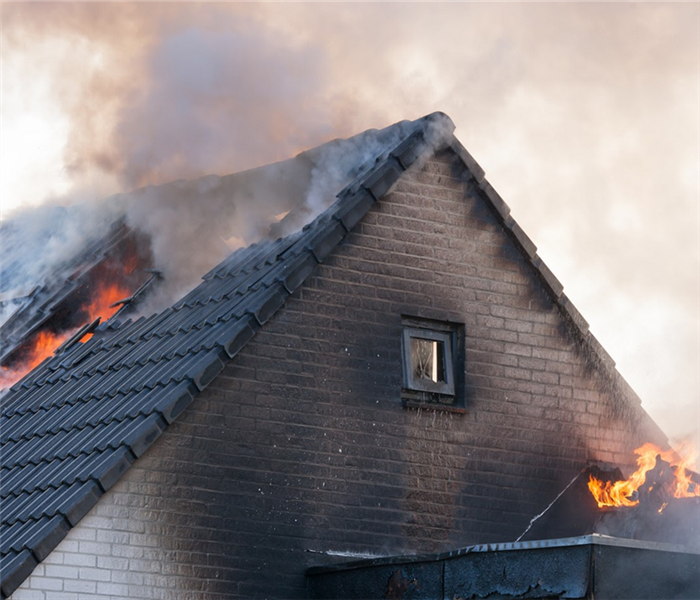 Quick action after a fire can help prevent the damage from escalating. Contact SERVPRO 24/7 for certified technicians and remediation services.
Quick action after a fire can help prevent the damage from escalating. Contact SERVPRO 24/7 for certified technicians and remediation services.
SERVPRO Has the Right Equipment for Safe Fire Restoration in Harrisonburg
No matter how small, a fire incident is always scary and can leave you feeling vulnerable. Porous surfaces such as ceilings, walls, and insulation absorb smoke residues. Soot also covers vast surfaces at your Harrisonburg property, staining textured materials. But with the right equipment, restoring normalcy is easy.
Fire damage in a Harrisonburg home can be invisible in some areas, and an average homeowner might easily miss it. Cleaning up after a fire, therefore, takes professional skill. SERVPRO crews remove visible soot and smoke particles from hidden places.
Tasks you should not attempt after a fire
- Do not operate unchecked electrical appliances
- Do not move or sit on upholstered furniture
- Never consume food products exposed to the extreme heat of a fire
- Do not water your indoor plants until you remove soot
How taking precautions eases fire restoration
You should not attempt some tasks yourself because of risks such as smoldering ash and toxic gases. SERVPRO has proper safety equipment to perform the work without the risks. To combat pervasive smoke odor, our crews use the thermal fogging technique. This method ensures deep penetration of deodorizing agents, neutralizing smoky odors. It is useful for concealed areas such as attics and works well for odor-absorbing insulation.
Safety steps while thermal fogging
- Ensure all individuals and pets have vacated the area
- Disable smoke detectors
- Extinguish pilot lights on appliances
To allow maximum fog penetration to crevices, SERVPRO IICRC-certified technicians ensure the treated area is undisturbed by limiting access to the site for some time. We also thoroughly ventilate to remove fumes before reoccupying. Setting up high-velocity air movers and exhaust fans helps turn over the air in the area.
SERVPRO of Rockingham and Augusta Counties knows how to apply fire damage restoration techniques for the best outcome. Call us at (540) 433-6100. We're Faster To Any Size Disaster.
Following Fire Damage Restoration Protocols in Harrisonburg
3/3/2022 (Permalink)
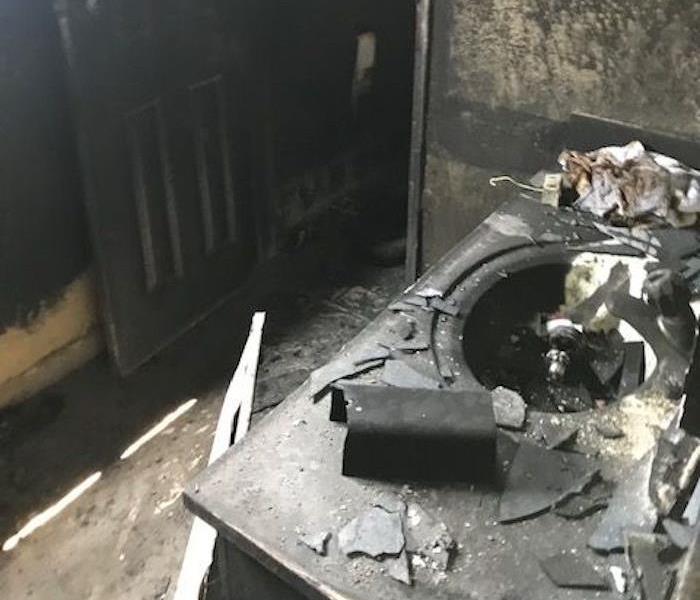 Contact SERVPRO to effectively tackle the fire damage in your property. Call now!
Contact SERVPRO to effectively tackle the fire damage in your property. Call now!
SERVPRO Provides Quality Fire Damage Restoration for Harrisonburg Residents
With the average in the United States being a home catching fire every 90 seconds, it is better to get prepared for anything to happen. As a homeowner in Harrisonburg, you can rest assured that you have fire and smoke restoration technicians (FSRT) ready to go at a moment’s notice should an emergency unfold. SERVPRO is known nationwide for stellar results, caring staff, and unbeatable smoke remediation and fire damage reconstruction. All homeowners have to do is pick up the phone to give us a call, and we can arrive within hours to begin the assessment!
With our team, fire damage restoration in Harrisonburg means no area gets left unaddressed in your home. The process takes time, but we work fast to help you get back to your routine more quickly than DIY, leaving your home “Like it never even happened.”
These are a few of the measures we take to ensure your property gets the attention it deserves:
Assessment and Protection
Each project begins with a thorough assessment to identify any hazards and the areas for cleaning. Smoke damage can lead to issues, so we determine the types of residues to formulate the best plan of action. This includes reviewing these areas:
- Unsalvageable contents/materials
- Security complications
- Exposure to the elements
- Electrical hazards
- Structural integrity
- Soot damage/infiltration
- Water Saturation
Cleaning and Deodorizing
We remove any standing water and moisture left from extinguishing the fire with the help of extractors and dehumidifiers. Our technicians also begin cleaning surfaces and removing charred debris while our odor control technicians (OCT) handle pungent smoke smells.
Reconstruction
SERVPRO always works to repair and restore rather than replace, but many fire incidents call for controlled demolition on some level. We may mend holes, replace drywall, repaint, and finish all areas to bring everything back to pre-fire condition.
When you need fire damage restoration, there is nothing better than the results you will get from SERVPRO of Rockingham and Augusta Counties. We are available for our 24/7 emergency service by dialing (540) 433-6100.
Fire Safety Tips for Your Pets
12/13/2021 (Permalink)
People consider pets as family but don’t always think about fire safety for them. Below are a few safety tips to consider:
- Pay attention to where your pets like to hide or sleep. This will help in case of a fire or other emergency in locating your pet.
- Keep both the phone number and address of your veterinarian and animal hospital in case of injury to your pet.
- Check your home for loose wires where a pet could accidently pull over a lamp or other electrical appliance.
- Never leave a burning candle or fireplace unattended around your pets.
- Have an emergency plan in place, include crating your pet and/or having a lease handy.
- Prepare a pet emergency kit to include food, water, blanket, medical record, along with any medications they may take.
- Prepare a list of pet friendly hotels or boarding kennels where you can take your pet if needed.
Fire Safety Tips for People with Functional Needs
10/26/2021 (Permalink)
When life happens and we need to use a walker, wheelchair, or other mobility device (crutches, scooter, etc.), to get around, we may tend to not think about fire safety.
In such cases, we should consider the following:
- Check to be sure that paths are clear, and you can get through doorways
- Widen doorways and have ramps installed, if needed
- Have a fire safety plan, practice it, and let others (family, neighbors, building manager) know what the plan is.
- Let your local fire department know ahead of time any special needs you have so that they can keep it on file in case of an emergency, contact them on their non-emergency line to provide them with the information.
- Always keep a phone handy and call 911 when an emergency occurs.
Time to Think About Fire Safety
10/8/2021 (Permalink)
It’s that time of year again to be thinking about the winter months. Whether heating with electric, gas, or wood, it is good to be prepared before needing to heat your home due to cooler temperatures.
If using portable electric heaters, be sure and keep them at least three feet away from anything that is combustible. Make sure that the heater has a thermostat control that will switch off automatically if the heater should happen to fall over.
If using fireplaces or woodstoves, be sure to inspect and clean both the stove pipes and chimney before using and then check monthly for damage or obstructions. Use a fireplace screen to cover the opening of the fireplace to prevent flying sparks and rolling logs from catching combustibles on fire. Be sure your gas, electric or wood fire is completely out in your fireplace before going to bed or leaving the house.
If you would happen to have a fire in your home, call SERVPRO of Rockingham and Augusta Counties at 540-433-6100. We are here to help!
Fire Safety Tips to Teach Children
9/20/2021 (Permalink)
Children should be taught the following if a fire occurs:
- If a smoke alarm or carbon monoxide alarm sounds, it means that there could be a dangerous situation involving fire, smoke, or a poisonous gas.
- If fire, smoke or carbon monoxide is present, they should crawl either on their hands and knees or on their belly instead of standing.
- Doors should be checked before opening them by feeling to see if they are hot. If they feel hot, they should try another way out.
- To follow an escape route that you have created and to not go back inside for any reason.
- To meet at a specific place outside that has been determined to be safe.
After teaching your children the above safety tips, practice with them. Then be sure to remember to go over the escape plan and tips on a weekly or monthly schedule depending on their age.
Outdoor Fire Safety Tips
4/29/2021 (Permalink)
When using your grill, make sure that it is positioned away from roof edges, siding, decking, tree branches and any other flammable material that could catch fire. Always use long-handled barbecue tools and never leave the grill while cooking.
Plant small, high moisture plants near your home instead of large plants or bushes. This will keep them from catching fire and spreading the fire to your home. Parallel fences should not be installed next to your home as they give fire fuel to burn hotter, longer and spread to other property. If there is fencing around your home, it should be a single fence and have metal or stone fence materials such as a metal gate, 5 feet from the house to your wooden fence.
Build campfires at least 15 feet away from tent walls, shrubs or things that burn. Be sure and use a metal screen over wood-burning fires to keep sparks from floating out. Turn off or put out fires before you leave your backyard or campsite.
Electrical and Appliance Fire Safety
2/9/2021 (Permalink)
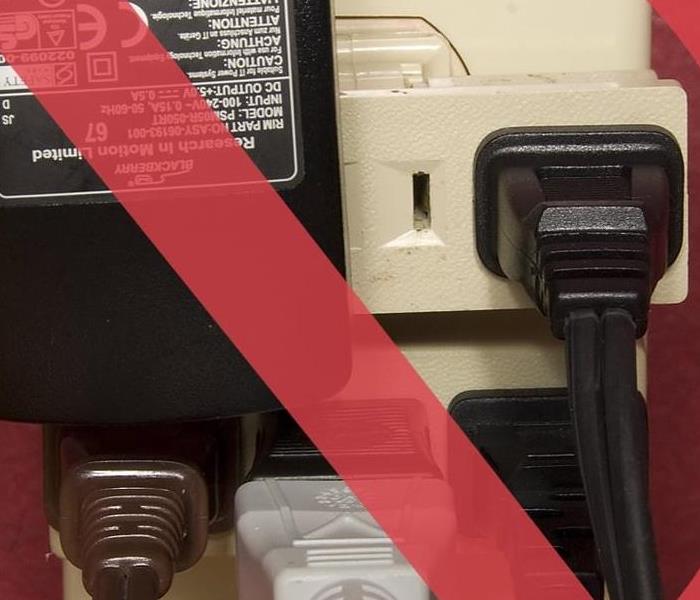 Do not overload electrical sockets!
Do not overload electrical sockets!
Over half of all home electrical fires involve lighting equipment or home electrical wiring.
- Check your electrical cords for cracks or damages. If damage is found, don’t try to repair them. Replace them instead.
- Extension cords should only be used as a temporary source. Have an electrician install additional outlets, if needed.
- Don’t overload extension cords or wall outlets.
- Never use an extension cord with a heat-producing appliance (coffee maker, space heater, or microwave). Plug only one heat-producing appliance directly into a wall outlet at a time.
- Major appliances, such as a refrigerator, stove, washer, or dryer should be plugged directly into a wall outlet.
- Use power strips that have internal overload protection.
- Use light bulbs that match the recommended wattage on a lamp or light fixture.
Holiday Fire Safety Tips
12/14/2020 (Permalink)
When getting ready for the holidays, be sure to keep safety in mind.
The top three days of the year for home candle fires are Christmas, New Year’s Eve and New Year’s Day.
- Check holiday lights before putting them up for frayed wires or excessive wear.
- Don’t put more than three strands of lights together.
- Consider using batter-operated flameless candles and if using regular candles be sure to trim the wicks before lighting and never leave them unattended. Keep candles at least 12 inches away from anything flammable.
- Place your live Christmas tree away from any heat sources and room exits. Be sure to water your live Christmas tree daily to prevent it from drying out. Get rid of your Christmas tree after Christmas or when it is dry.
COOKING SAFETY TIPS
10/27/2020 (Permalink)
Cooking is the leading cause of home fires and injuries.
Be aware of your cooking temperature. Fires start when the heat is too high. If there are signs of smoke or the grease starts boiling, turn off the burner.
Watch what you are cooking, especially when frying foods. Most cooking fires start when someone is frying food.
Roll up your sleeves or wear short sleeves to keep them from catching fire when cooking.
Keep things away from the stove: dishtowels, bags, boxes, paper and curtains. All of these can easily catch on fire.
Turn pot handles toward the back of the stove, this helps in keeping them from being bumped or children pulling them off of the stove.
Make sure to keep children and pets three feet away from a hot stove to prevent injuries.
Smoke Alarm Safety
10/9/2020 (Permalink)
Three out of five home fire deaths are a result of non-working smoke alarms.
- When choosing a smoke alarm for your home, choose interconnected smoke alarms, so when one goes off, they all will.
- Make sure that the alarms work by testing them once a month and replacing the batteries at least once a year.
- Replace your smoke alarm every 10 years.
- If you have a wood or gas fireplace/stove or other gas appliance, you should have a combination carbon monoxide/smoke detector installed instead of just a smoke alarm.
Working carbon monoxide/smoke detector save lives. Make sure to have alarms on every level of your home, inside and outside each bedroom or sleeping area. When a smoke alarm goes off, you may less then 2 minutes to get everyone out.
Home Heating Fire Safety
9/25/2020 (Permalink)
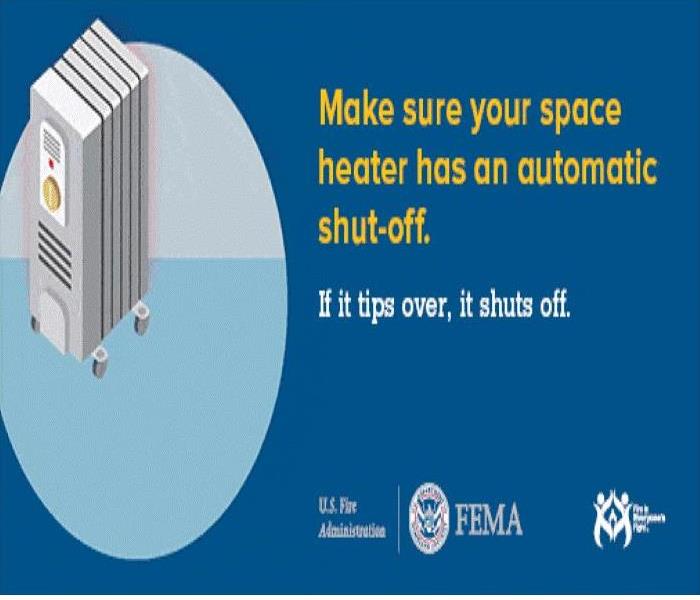 Space Heater Safety
Space Heater Safety
Heating your home is the second leading cause of home fires.
If heating your home with a wood burning stove or fireplace, you should have your chimney and vents professionally cleaned every year.
Place cooled ashes in a tightly covered metal container. Keep the container outside and away from any structures. It should be at least 10 feet away from your home and any other buildings.
Make sure to keep anything that could burn at least 3 feet from whatever heat source you use to heat your home (wood stove, fireplace, space heaters or radiators).
You should only plug in one heat producing appliance (electric fireplace or space heater into an electrical outlet at a time. Make sure they have an automatic shutoff.
Never use a stove or oven to heat your home and be sure to turn off your space heater when leaving the room or going to bed.
Fire Safety During a Home Fire
9/11/2020 (Permalink)
If you find yourself trapped in a fire situation in your home:
Before opening a door, check to see if the doorknob or door is hot. If either one of them are, leave the door closed and use a different way out if possible.
If you open a door, do it slowly. Be ready to close it fast if heavy smoke or fire is seen.
If you cannot get out, close the door, place something such as clothing, towel, or tape around the door to keep smoke out. Cover any vents in the room as well. Stay where you are and signal for help by using a flashlight or light-colored cloth at a window.
Stay low to the floor when exiting the room or while waiting for help to arrive.
Call 911 as soon as possible.
Lawnmowers Can Cause Fire Damage
6/9/2020 (Permalink)
Any lawn mower, electric or gas can catch fire.
Fuel hazards are one of the leading reasons for fire in the gas-powered lawnmower. Fuel leaking onto the motor, as well as fuel vapors around a hot muffler can cause a fire. A gas cap leak or sloppy fueling can easily spark a fire.
Experts recommend that you fill a mower only when it is cool.
Gas powered mowers are not the only type responsible for fires. Electric mowers can have a short in the circuit board or power cord.
Mowers frequently cause fires by the way they are used as well. Using a mower in tall, dry grass can cause the grass to become stuck in the mower deck. This grass gets packed into the hot muffler and catches fire. Not only does the mower get burned, it can set off a grass or field fire which could also affect structures such as homes, garages and outbuildings.
Best practices for using your lawn mower include:
* Never fuel up a hot mower.
* Replace any leaky gas caps.
* Clear rocks from the mowing area.
* Keep the mower clean of fuel.
* Routinely clean out grass from the mower blades with a hose. Never put your hands near the blade unless the spark plug has been disconnected and the unit has completely cooled.
SERVPRO of Rockingham and Augusta Counties is available 24/7 365 days a year to assist you with fire/smoke damages at your home or business. Contact us at 540-433-6100
Get Expert Fire Damage Cleanup For your Rockingham and Augusta Home
1/6/2020 (Permalink)
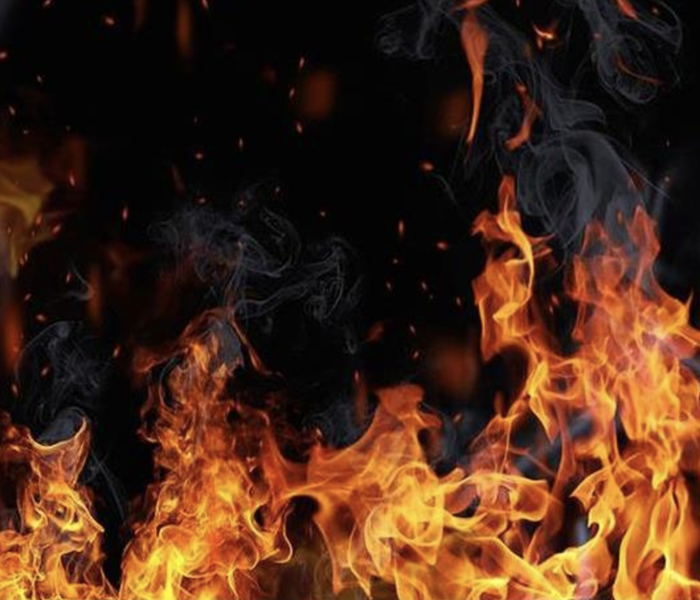 We're Faster to Any Size Disaster and restore the house to its preloss condition.
We're Faster to Any Size Disaster and restore the house to its preloss condition.
A fire disaster in your home is a traumatic experience, and it can also cause devastating losses. Smoke and soot can affect different surfaces, including walls, ceilings, floors, appliances, and upholstery. You need to act quickly after a fire loss to restore your home to its pre-damaged state.
In an unfortunate event of fire damage in your Rockingham and Augusta County home, call fire restoration professionals immediately to prevent further damage. Lingering smoke and soot from the fire can circulate throughout your home and harm the indoor air quality. A professional restoration company such as SERVPRO can help you take care of the damage. We have the experience, workforce, and equipment required to deal with fire loss incidents.
If the flames caused an opening in your home, we could board up the area to secure your property and prevent damage that precipitation may cause. If there is no power in your home after the incident, our crew can use flashlights and power generators to establish emergency lighting.
A fire may also leave debris in your home like broken items and nails, and they can cause injuries to the people living in it. The exterior of your house may also have items that may need to be disposed of, such as torn gutters, ash, and damaged shingles. Our crew can remove such items to simplify the restoration process.
Our technicians can also perform initial cleaning to prevent secondary destruction from soot residues. We can pre-clean furniture and soot to remove the heaviest soot. Our Fire & Smoke Damage Restoration Technicians (FSRTs) may also wipe acidic soot residues from metals and porcelain. We perform a thorough cleaning of the affected structures and contents with environmentally friendly products.
Our SERVPRO technicians can also wet clean some of your possessions to remove moderate to heavy residues. Wet cleaning is suitable for items that do not sustain damage when soaked in water. After cleanup, we can deodorize your home and its contents using air scrubbers or thermal fogging.
SERVPRO of Rockingham and Augusta Counties at 540-433-6100 is ready to handle fire damage in your home. We're Faster to Any Size Disaster and will restore the house to its preloss condition.
Thanksgiving Cautions: Dangers to Consider before Deep Frying Your Turkey
11/4/2019 (Permalink)
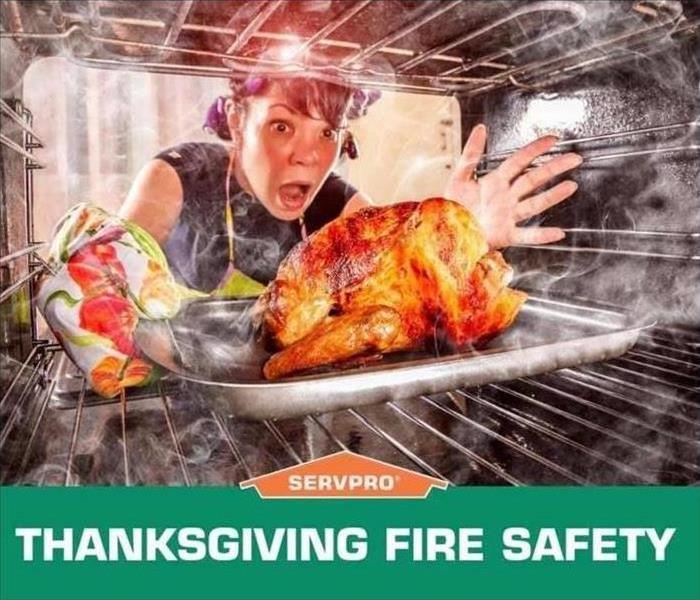 Thanksgiving safety tips
Thanksgiving safety tips
Serving a deep-fried turkey on Thanksgiving has grown in popularity over the years as people experiment more in their kitchens. While it may be a mouth-watering option is the risk truly worth it? Many of you may have seen the numerous videos of turkey fryer explosions and fires publicized online. Don’t run the risk of property damage or injury – make sure you take the proper precautions when menu planning this season; especially if you are taking on a deep-fried turkey.
- Turkey Fryers can easily tip over, spilling hot cooking oil over a large area. Consider the placement of the fryer, is it flat, sturdy, out of reach from children?
- An overfilled cooking pot will cause the oil to spill when the turkey is put in and a frozen or partially frozen turkey will cause cooking oil to splatter (sometimes with great force) when putting in the pot
- Even a small amount of cooking oil spilled on a hot burner can cause a considerable flame or fire
- Without thermostat controls, some turkey fryers can overheat oil to the point of starting a fire. Make sure it’s not too hot.
- The sides of the cooking pot, lid and handles can get dangerously hot. Protect your hands when maneuvering to prevent injury or spillage
Your friends at SERVPRO of Rockingham and Augusta Counties wish you a Happy Thanksgiving and remind you to stay safe. Remember, our team is on call 24/7 365 days a year, no matter what holiday or time of night. If you experience a fire SERVPRO of Rockingham and Augusta Counties will come to your rescue, don’t hesitate to call (540) 433-6100.
October Is National Fire Prevention Month
10/14/2019 (Permalink)
October is Fire Prevention Month! The goal of Fire Prevention Month (and week October 6th – 12th ) is to raise awareness about fire safety and help ensure your home and family are prepared in the event of an emergency.
Home Safety Checklist
Smoke Alarms
- There is one smoke alarm on every level of the home and inside and outside each sleeping area.
- Smoke alarms are tested and cleaned monthly.
- Smoke alarm batteries are changed as needed.
- Smoke alarms are less than 10 years old.
Cooking Safety
- The cooking area is free from items that can catch fire.
- A kitchen stove hood is clean and vented to the outside.
- Pots are not left unattended on the stove.
Electrical & Appliance Safety
- Electrical cords do not run under rugs.
- Electrical cords are not frayed or cracked.
- Circuit-protected, multi-prong adapters are used for additional outlets.
- Large and small appliances are plugged directly into wall outlets.
- The clothes dryer lint filter and venting system are clean.
Candle Safety
- Candles are in sturdy fire-proof containers that won’t be tipped over.
- All candles are extinguished before going to bed or leaving the room.
- Children and pets are never left unattended with candles.
Carbon Monoxide Alarms
- Carbon monoxide alarms are located on each level of the home.
- Carbon monoxide alarms are less than 7 years old.
Smoking Safety
- Family members who smoke only buy fire-safe cigarettes and smoke outside.
- Matches and lighters are secured out of children’s sight.
- Ashtrays are large, deep and kept away from items that can catch fire.
- Ashtrays are emptied into a container that will not burn.
Heating Safety
- Chimney and furnace are cleaned and inspected yearly.
- Furniture and other items that can catch fire are at least 3 feet from fireplaces, wall heaters, baseboards, and space heaters.
- Fireplace and barbecue ashes are placed outdoors in a covered metal container at least 3 feet from anything that can catch fire.
- Extension cords are never used with space heaters.
- Heaters are approved by a national testing laboratory and have tip-over shut-off function.
Home Escape Plan
- Have two ways out of each room.
- Know to crawl low to the floor when escaping to avoid toxic smoke.
- Know that once you’re out, stay out.
- Know where to meet after the escape.
- The meeting place should be near the front of your home, so firefighters know you are out.
- Practice your fire escape plan.
Why Choose SERVPRO of Rockingham and Augusta Counties?
SERVPRO of Rockingham and Augusta Counties is locally owned and operated.
Our certified cleaning and restoration specialists are faster to any size disaster. Providing emergency cleaning and restoration services 24 hours a day, 7 days a week—including all holidays. You can expect an immediate response time, day, or night.
Keeping Your Family Safe During Halloween from Fire Risks
9/27/2019 (Permalink)
Halloween is a fun time of year, but without precautions, it can lead to house fires. The Harrisonburg, Virginia website offers some great tips and suggestions to keep holidays safe and fun.
If you experience fire damage, call SERVPRO of Rockingham and Augusta Counties at 540-433-6100 for 24/7 emergency service.
TIPS FOR CHOOSING THE RIGHT COSTUMES:
- Purchase costumes made of flame-resistant or retardant material (Check the label). Fire-resistant does not mean fireproof
- Keep hemlines short enough to prevent tripping
- Avoid loose and baggy sleeves. Stay away from billowing or long trailing fabric.
- Use make-up instead of masks which can obstruct vision.
- Use glow in the dark reflective tape on your costume.
TIPS FOR DECORATING:
- Never use candles to light jack-o’-lanterns, use battery-powered lights.
- Instruct children to stay away from open flames.
- Be extremely careful with cornstalks and other harvest season items. Keep them away from sources of heat.
- Keep exits clear of decorations so nothing blocks escape routes
TIPS FOR HALLOWEEN NIGHT:
- Children should always go trick-or-treating with a responsible adult.
- If driving, be sure to watch for trick-or-treaters who are too busy to watch for you.
- Provide children with flashlights or glow sticks to carry for lighting and visibility.
- Do not allow children to carry sharp sticks or other objects that could cause injury to others.
- Keep your yard free of tripping hazards, such as garden tools, hoses, etc.
- Closely inspect all candy before allowing children to eat it. Discard any unwrapped treats from a stranger. If in doubt, throw it out.
Fall Safety Tips
9/24/2019 (Permalink)
When the weather turns cold most people spend more time inside their homes using fireplaces, furnaces, and heaters to keep warm. There's nothing quite as cozy as a fire, but it presents some safety hazards. Keep these tips in mind.
Service Your Furnace
Before the cold autumn and winter weather sets in, be sure to call your heating and cooling company to service your furnace. A specialist should inspect the furnace to make sure everything is in working order and that there are no leaks.
Use Fireplaces Safely
Keep that fire in its proper place by using a fireplace screen to keep sparks from flying out of the fireplace. Never leave a burning fire unattended, and make sure a fire in a fireplace is completely out before going to bed.
Use Caution with Space Heaters
A space heater can be an effective way to warm up a chilly room, but it's essential that you read the instructions on the unit before you use it. If your space heater requires venting, make sure you have vented it to the outdoors. Never use your stove or oven to heat your home; only use space heaters that are approved for this purpose. Always allow at least three feet of empty area around space heaters.
Reconsider Leaf Burning
The Air Defenders reports that burning leaves produces dangerous and cancer-causing chemicals and urges homeowners to avoid disposing of leaves this way. If you decide to burn leaves, wear a protective mask. Burning leaves should only be attempted far away from a house or other structures on a homeowner's property. Always check the weather forecast before starting to burn leaves. This activity should not be attempted in windy conditions.
Exercise Candle Caution
Candles are a great way to give a room that warm glow, but they can also cause fires. According to the National Candle Association, almost 10,000 home fires start with improper candle use. Never leave candles burning if you go out or go to sleep, and keep your candles away from pets and kids.
Change Smoke Alarm Batteries
Change the batteries in your smoke alarms and carbon monoxide detectors when you turn back your clocks for Daylight Saving Time on November 3rd. Make sure to check the alarms with the new batteries installed. Check and replace any home fire extinguishers that have expired.
Why Do You Need Professional Fire Damage Restoration After A Fire?
8/10/2019 (Permalink)
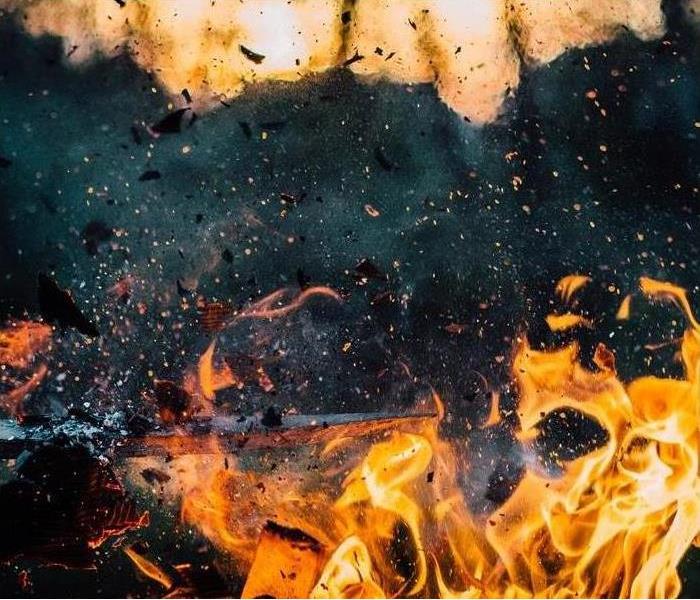 Our certified cleaning and restoration specialists are faster to any size disaster.
Our certified cleaning and restoration specialists are faster to any size disaster.
Fire damage to your home can be traumatic. In addition to the destruction from heat, your property and belongings can be damaged by smoke and soot. Smoke particles can coat walls, ceilings, and almost any surface and cause permanent damage if not cleaned quickly and efficiently.
The particles in the smoke contain unburned carbon that can be difficult to remove after a fire. Furthermore, not all particles are alike, and it takes a multi-step process to eliminate them. It’s a job for professionals who have years of training and expertise in fire damage restoration. Here are some strategies that professionals use to get rid of smoke and soot damage from your property.
Strategies are developed based on the type of residue
Here at SERVPRO of Harrisonburg/Rockingham County, our expert team evaluates the type of smoke residue and prepares a plan accordingly. Dry smoke residue is easier to clean than wet smoke residue. As dry smoke residue does not stain the surface as intensely as wet smoke residue, it is easier to remove by wiping. In these cases, our IICRC certified technicians use less aggressive methods to clean surfaces.
Wet smoke residues, on the other hand, are significantly harder to clean. The heat streams during a fire can drive these smoke particulates deep into cracks, crevices, and porous surfaces, further exacerbating the difficulty of cleanup. SERVPRO of Harrisonburg/Rockingham County technicians uses a variety of methods such as wet cleaning, foam cleaning, and abrasive cleaning to mitigate the damage caused by wet smoke residues.
Deodorizing
Smoke and soot pose another challenge during the restoration process—the odor. If proper precautions are not taken during restoration, the scent can linger long after the fire. SERVPRO of Harrisonburg/Rockingham County technicians uses Ultra Low Volume (ULV) foggers, heat foggers, deodorizing beads, and other methods to combat odors. Our technicians have years of experience in managing odors after fires of all sizes. We get your home smelling like home again in no time.
Call SERVPRO of Harrisonburg/Rockingham County at (540) 433-6100 today to talk to one of our fire restoration experts.
Why Choose SERVPRO of Harrisonburg/Rockingham County?
SERVPRO of Harrisonburg/Rockingham County is locally owned and operated. Our certified cleaning and restoration specialists are faster to any size disaster. We are providing emergency cleaning and restoration services 24 hours a day, 7 days a week—including all holidays. You can expect an immediate response time, day, or night.
NOT EVERYTHING IS SAFE TO BURN IN YOUR FIREPLACE OR WOOD STOVE
1/3/2019 (Permalink)
Please remember not everything is safe to burn in your fireplace or wood stove. Sometimes items that you think would be safe to burn are not. Some items can cause serious health issues or safety issues if burned. For example, burning glossy paper such as wrapping paper or newspaper ads could possibly put toxins or carcinogens in the air that you breathe. Some items burn faster than others creating a high, intensely hot flame that could catch any built-up creosote in a chimney on fire. Below is a list of a few items you should never put in your fireplace or wood stove.
~Paper, Bows, Glossy Paper, Cardboard & Packaging
~Plastics, Pine Needles, Live Garland, Live Wreaths or Flowers
~Styrofoam Containers, Egg Cartons, Dryer Lint
~Painted, Varnished, Stained or Treated Wood
~Engineered Wood (Plywood, Particle Board, Pressed Board, OSB) Glue compounds are used in the layering of these woods.
~Green Wood – Wood that is not dry will produce a lot of smoke and creosote.
~Driftwood – Driftwood contains salt which is corrosive. When heated, corrosion is accelerated and toxic fumes are produced.
These are just some of the items you should never burn. Please follow all safety directions on your wood burning appliance.
Always have a fire extinguisher and a carbon monoxide detector nearby and change the batteries on a schedule.
Cooler Weather Means an Increase in House Fires
11/27/2018 (Permalink)
Fall and Winter often bring an increase in the number of people who have lost their homes, and sometimes their lives, due to house fires. Here are a few reasons why house fires typically happen more during the colder months:
More Time Spent Indoors
Colder weather means that most people find themselves wanting to make like a bear and hibernate. People are much more inclined to spend a lot more time at home curled up under a blanket with a cup of tea, or hot cocoa than they are outside socializing. Homeowners that are normally outside during the warmer months find themselves, their kids, and their pets spending days on end staying completely indoors. All of this time indoors means that the family is using more electricity and heat sources than usual which greatly increase the chances for a house fire.
Additional Heating Methods
Most people use multiple heating sources during the winter on top of their normal furnace usage. Space heaters and fireplaces are all used to help create extra warmth or beautiful ambiance during the cold seasons. Knowing how to properly use a space heater can potentially avoid it from causing a fire. It is best to make sure you are not placing it near anything that could catch on fire, to not leave it too close to any fabrics or your bed and not to leave it unattended. When purchasing a space heater trying to look for and purchase one with safety features that’ll turn off by itself if knocked over or if it becomes too hot. It is especially important in keeping your home safe this winter. Fireplaces should always be watched and attended to and not left alone to burn. It is common for sparks and burning wood to fly out from the flames, even around some fireplace screens. These can easily catch carpet and nearby flammables on fire.
Cooking
Most fires that happen inside homes during the winter are ignited from cooking. The colder weather forces most of us to cook indoors instead of using the outdoor grill. All of the extra meals, especially large holiday ones, increase the chances of a house fire. Making sure someone is always present and paying attention while a meal is cooking is key to keeping your home safe.
If your home does experience a fire, the professionals at SERVPRO of Harrisonburg/Rockingham County are here for you. We can be reached 24/7 at 540-433-6100.
The Makeup of Smoke
9/19/2018 (Permalink)
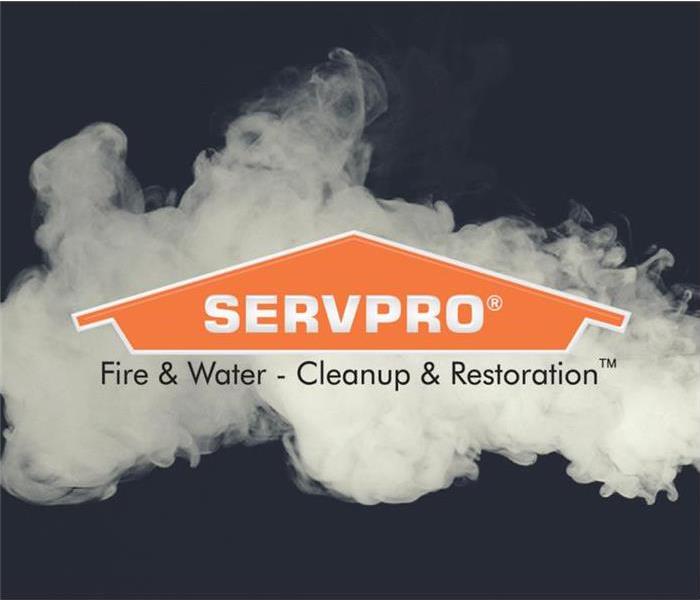
There are several components that make up smoke. Learning about these components can lead to a better understanding of just how badly smoke damage can be after a fire. Each part contributes a part to the odor a fire leaves. Particles are the partially or completely burned substances that can penetrate fabrics and surfaces. These can be toxic at times. Vapors are fog-like, misty droplets that can become dangerous if one inhales or absorbs them. The third component is toxic gases. Although these are odorless, carbon monoxide is the most common gas that will result from a fire and is dangerous. Phosgene gas results from household products like plastics, vinyl, and other chemicals are burned. Hydrogen cyanide is a product of the burning and combustion of insulation, clothing, carpet, synthetics and plastics. Due to the complex makeup of smoke and all the different ways it can be produced, it is hard to get the smoky odor out of many household items unless cleaned by a professional service.
Content provided by: https://www.resolvebylowes.com/guidance/fire/how-smoke-damages-a-home/115000893728
10 Important Fire Damage Facts
9/19/2018 (Permalink)
While flames can cause the most visible damage to your property during a fire, smoke and soot are silent and sometimes invisible hazards that could cost lives. Water is also a reason for damage after a fire. Even firefighters themselves may cause some damage before they can completely put out a fire. Here are 10 important things to know about fires.
- In a fire, more people die from inhaling smoke than from the flames. Never think that if you avoid the flames you are safe. Always keep away from smoke.
- Soot is a coating of fine, black dust created when wood, coal, or oil-based substances are burned. These carbon particles float into the air and settle anywhere. Inhaling soot can cause severe lung deficiencies or even death.
- If soot contaminates items in your home or business, a fire restoration service provider like SERVPRO must assess the damage to see if restoration is possible.
Need Fire Restoration Advice or Services? Call SERVPRO of Harrisonburg/Rockingham County at 540-433-6100
- The worst possible effect of soot is its tendency to cause cancer and cause serious defects in newborns. Soot produces polycyclic aromatic hydrocarbons. These hydrocarbons are responsible for gene mutation for particular groups of genes. They can cause birth defects and increase the chances of getting cancer.
Water’s Good and Bad
5. Water’s great at putting out most fires but the water itself can cause great damage. You must make sure, after the fire is out, that your home or business is completely dried.
- Mold colonies can begin to grow just 48 hours after water damage occurs. The combination of fire, water, and mold damage to your commercial property or home could result in a complete loss if not handled properly. See our posts about mold, mold myths, and how to clean up mold.
- Use caution if you decide to do some of the cleanup after a fire. Never start your cleaning process until you’re properly attired. Wear heavy-duty gloves, safety goggles, and a facemask. Carefully cover your nose and make sure your safety glasses have no place for dust or soot to get into your eyes.
Why Firefighters Break Windows and Cut Holes In Roofs
8. Firefighters are true heroes. However, they often must break windows and cut holes in the roof of buildings on fire. As a fire burns, the fire moves up and down and across, growing very fast. Firefighters break windows and cut holes in roofs to provide ventilation that slows the fire’s growth. Ventilation also helps get rid of dark smoke that makes it hard for firefighters to see where they’re going. The holes and broken windows help firefighters fight the fire more quickly. The bottom line is that breaking windows and cutting holes in roofs help save lives and property.
9. Firefighters will also cut holes in walls at times. That’s not about ventilation. It’s done so the fire department is sure that the fire is completely out. Fire departments don’t want to risk leaving a fire that’s not visible but is still active inside the walls or in other hidden places.
10. If you have a fire, get a copy of the fire report. In most areas, a fire report is a public document. Ask for it at the fire department or fire marshal’s office. The fire report will help you with information that your insurance company and other official offices may request.
Here to Help
The team at SERVPRO of Harrisonburg/Rockingham County has specialized training and experience in fire restoration services and natural disaster cleanup.
Call SERVPRO of Harrisonburg/Rockingham County 540-433-6100 anytime, 24/7.
Stop, Drop, Roll and Extinguish - The A,B,C's of Fire Extinguishers
9/19/2018 (Permalink)
Fire extinguishers are a common sight in most houses across the United States as many states have implemented laws requiring each household to have one. What most people don’t know is that there are actually four different classes of fire extinguishers that work to put out different types of fires. It is important to be informed of these different classes in order to purchase the best extinguisher for your own house or apartment.
The classes of extinguishers are labeled as Class A, B, C, and D - each best for putting out a different type of fire.
- Class A extinguishers: best at putting out fires in ordinary combustible materials, such as wood and paper
- Class B extinguishers: best for use on flammable liquids such as gasoline, oil and grease
- Class C extinguishers: best for use only on electrically energized fires
- Class D extinguishers: best for use on flammable metals
Although there are four different classes, most fire extinguishers are sold as a combination of the classes to cover a broader range of fires. Some will be sold as A-B, or even A-B-C. Next time you are at the store shopping for you new extinguisher make sure you keep this information in mind to help you prepare best for any type of fire you may be faced with.
Content provided by: https://www.nationwide.com/fire-extinguisher-safety.jsp
SERVPRO of Rockingham and Augusta Counties Smoke and Soot Cleanup
8/23/2018 (Permalink)
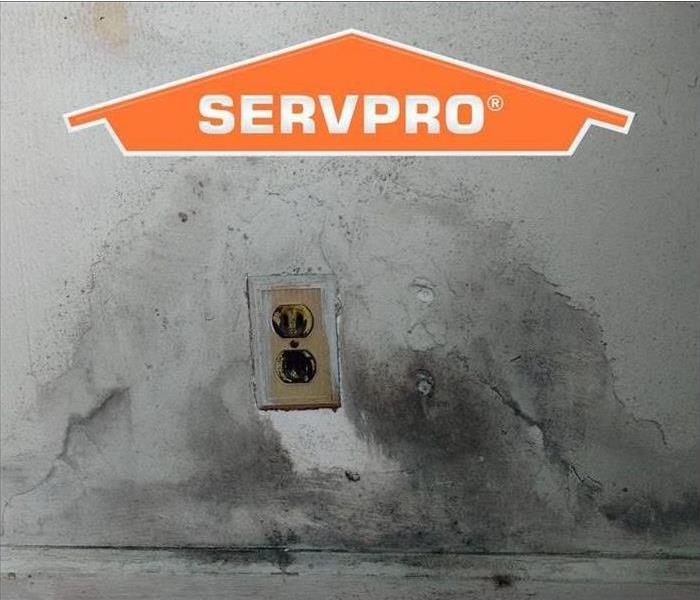 Smoke and Soot Damage Can Cause a Pervasive Odor in Your SERVPRO of Rockingham and Augusta Counties Home.
Smoke and Soot Damage Can Cause a Pervasive Odor in Your SERVPRO of Rockingham and Augusta Counties Home.
Smoke and soot is very invasive and can penetrate various cavities within your home, causing hidden damage and odor. Our smoke damage expertise and experience allows us to inspect and accurately assess the extent of the damage to develop a comprehensive plan of action.
Smoke and soot facts:
- Hot smoke migrates to cooler areas and upper levels of a structure.
- Smoke flows around plumbing systems, seeping through the holes used by pipes to go from floor to floor.
- The type of smoke may greatly affect the restoration process.
Different Types of Smoke
There are two different types of smoke–wet and dry. As a result, there are different types of soot residue after a fire. Before restoration begins, SERVPRO of Rockingham and Augusta Counties will test the soot to determine which type of smoke damage occurred. The cleaning procedures will then be based on the information identified during pretesting. Here is some additional information:
Wet Smoke – Plastic and Rubber
- Low heat, smoldering, pungent odor, sticky, smeary. Smoke webs are more difficult to clean.
Dry Smoke – Paper and Wood
- Fast burning, high temperatures, heat rises therefore smoke rises.
Protein Fire Residue – Produced by evaporation of material rather than from a fire
- Virtually invisible, discolors paints and varnishes, extreme pungent odor.
Our Fire Damage Restoration Services
Since each smoke and fire damage situation is a little different, each one requires a unique solution tailored for the specific conditions. We have the equipment, expertise, and experience to restore your fire and smoke damage. We will also treat your family with empathy and respect and your property with care.
Have Questions about Fire, Smoke, or Soot Damage?
Call Us Today – SERVPRO of Rockingham and Augusta Counties at 540-433-6100.
 SERVPRO strives for sustainability when restoring fire damaged Harrisonburg homes. Even our equipment is green!
SERVPRO strives for sustainability when restoring fire damaged Harrisonburg homes. Even our equipment is green!





 24/7 Emergency Service
24/7 Emergency Service








